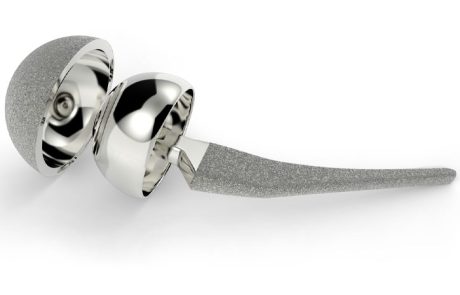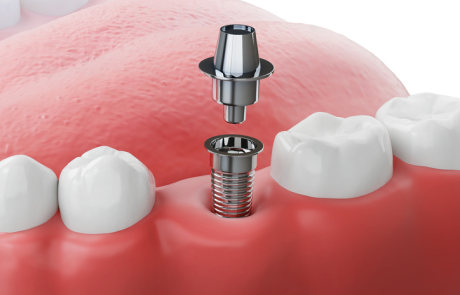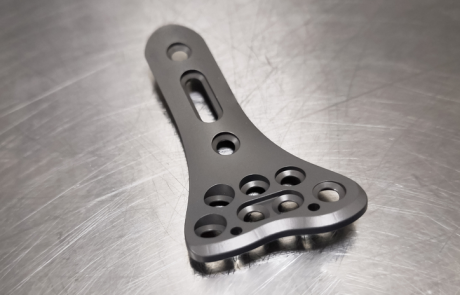It’s probably no news to those of us who had hip or knee replacements that something magic allows us to walk again as we did when we were much younger. Those years of practicing extreme sports, like squash or long-distance running, took their toll. It was titanium, that wonder metal that allows us to fly higher and further, that held up its hand and showed us the way to renewed joint comfort.
A tremendous amount of research has been done worldwide on the selection and processing of titanium alloys for biomedical applications. Titanium and its alloys have excellent biocompatibility, strength, and corrosion resistance; not to forget their strength-to-weight ratio.
Titanium alloys have emerged as the most successful material in biomedical applications, in the fields of orthopedics and dentistry. Titanium and its alloys have a unique ability to bind with bone and living tissue, making them ideal for orthopedic implants such as knee and hip replacements, as well as dental implants. The body’s tissue grows onto the titanium surface, creating a strong and stable interface.
Certain titanium alloys are highly suited for use in the medical area. Ti 6Al-4V ELI (Extra Low Interstitial) is one of the most commonly used titanium alloys in this field. In this case, ELI means maximum values of carbon, hydrogen, nitrogen, and oxygen. Its properties make it ideal for applications where strength, durability, and biocompatibility are critical. Ti 6Al-4V ELI offers a good strength-to-weight ratio, very good corrosion resistance, and excellent biocompatibility. The extra-low interstitial (ELI) grade gives improved toughness and reduced susceptibility to embrittlement. Ti 6Al-4V ELI is frequently used in orthopedic implants, dental implants, and other critical medical devices where high performance is required.
Ti 6Al-7Nb is another titanium alloy that shows excellent corrosion resistance and biocompatibility. These properties make it effective for long-term human body implantation. It is less prone to allergic reactions than other titanium alloys. Ti 6Al-7Nb is used in a number of medical applications, including implants and prosthetics, where its biocompatibility and strength are essential properties.
Commercially Pure (CP) Titanium is available in four primary grades, with distinct mechanical properties that render them suitable for a range of medical applications.
Grade 1 has very good formability due to its softness and ductility. As such, it is ideal for applications where complex shapes are required and is commonly used in the manufacture of surgical instruments and implants where high ductility is necessary.
Grade 2 is the most widely used CP grade. It shows a balance between strength and ductility, and has excellent corrosion resistance. These properties make it suitable for dental implants, surgical implants, and various prosthetic devices.
Grade 3 has higher strength than Grades 1 and 2, and is thus less formable. It is used where that higher strength is needed in, for example, certain orthopedic implants.
Grade 4 is the strongest CP grade. It has excellent corrosion resistance and biocompatibility. It fits the bill for demanding applications such as dental implants, bone screws, and other surgical implants. It is also the most difficult CP grade to form and machine, thus special care and techniques are required in these two operations.
It is evident that production of these titanium alloys for such critical applications will require the utmost care and quality control at all stages of processing, from melting through forging, heat treatment, and final machining. There is obviously no room for error here, and only the highest quality material will make it through to the final application. Heat treatment of Ti alloys for biomedical applications is critical, due to their reactivity with gases such as oxygen and nitrogen. These gases tend to promote the formation of the detrimental so-called alpha case layer on the outer surface. Thus, heat treatments are usually carried out within a vacuum and the fast-cooling rates necessary are achieved by gas cooling with inert gases.
The final machining process of these highly critical parts, from bars, coils, or shapes, is carried out using newly developed techniques that will ensure both the surface finish and the tolerances required. It is possible that machining will result in residual stresses in the part, in which case a stress relief treatment is applied.
There are numerous applications of titanium in the biomedical field, and most titanium alloys can find a place in this field, providing the mechanical and biomedical properties are suitable. As previously mentioned, a tremendous amount of medical research has been carried out on this material, and many, many people have benefitted from the medical implants that have been, and continue to be, manufactured. It all starts with primary and secondary melting techniques that will lead to the cleanest alloy possible.
At AMFG we are aware of the necessity for the production of the cleanest alloys available in this most critical of applications and the forging techniques to produce titanium parts for many industries.








